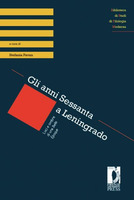Gli anni Sessanta a Leningrado
Abstract
This book offers a portrait of Leningrad in the 1960s, of its cultural life in those years permeated by a great hope for change. Leningrad, now St. Petersburg, is the heir and witness of the rise and fall of the 'Soviet hope' for an authentic change, its evolution and its inevitable decline. Through an analysis of the poems of Iosif Brodskij, Stefania Pavan maps out the process that led the intelligencija of Leningrad to disclose their claims, to give shape to the intellectual conscience of the city, and that subsequently constrained them to adopt the opposite approach, concealing – in a semi-visible space and in the myriad modes of the 'samizdat' – the values, names and images of the hope of change. Through an analysis of the linguistic peculiarities of The dregs , one of the 'classic' short stories of Boris Ivanov, Simonetta Signorini proposes a micro-history of the Russian language in the 60s, to which the study carried out by Ljudmila Zubova on the poems of Viktor Sosnora makes a useful contribution. The essay by Irina Dvizova highlights an aspect of the culture of Leningrad that can be considered extremely topical, in terms both of argument and as a method of reading literary history: the relation between the city and the Dostoevskij museum. Il volume propone un ritratto di Leningrado degli anni Sessanta, della sua vita culturale nell'Unione Sovietica, in quegli anni attraversata da una forte speranza di cambiamento. Leningrado, oggi San Pietroburgo, è erede e testimone della parabola della 'speranza sovietica' di un mutamento autentico, del suo evolversi e inevitabile esaurirsi. Stefania Pavan, attraverso l'analisi dei versi di Iosif Brodskij, disegna il percorso che ha condotto l'intelligencija di Leningrado nel 'disvelare' le proprie istanze, nel dare forma alla coscienza intellettuale della Città, e che l'ha vista costretta ad adottare successivamente la via inversa, a 'celare' in uno spazio semivisibile e tramite infinite modalità del 'samizdat', i valori, i nomi e le immagini della speranza del cambiamento. Con l'analisi delle particolarità linguistiche di La feccia, uno dei racconti 'classici' di Boris Ivanov, Simonetta Signorini propone una micro-storia della lingua russa negli anni Sessanta, alla quale lo studio di Ljudmila Zubova condotto sui versi di Viktor Sosnora dà un utile contributo. Il saggio di Irina Dvizova mette in evidenza un aspetto della cultura di Leningrado che è da considerare molto attuale sia come argomento che come metodo di lettura della storia letteraria: il rapporto fra la città e il Museo Dostoevskij.
Keywords
literature; russia; letteratura; poetry; poesiaDOI
10.26530/OAPEN_341468OCN
808382376Publisher
Firenze University PressPublisher website
https://www.fupress.com/Publication date and place
2009Series
Biblioteca di Studi di Filologia Moderna,Classification
Linguistics
Literary essays
Social and cultural history


 Download
Download